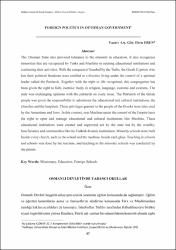| dc.contributor.author | Eren, Ebru | |
| dc.date.accessioned | 2018-09-07T07:03:14Z | |
| dc.date.available | 2018-09-07T07:03:14Z | |
| dc.date.issued | 2017 | |
| dc.identifier.uri | https://hdl.handle.net/20.500.11776/2991 | |
| dc.description.abstract | Osmanlı Devleti hoşgörü anlayışını azınlık kesimine eğitim konusunda da sağlamıştır. Eğitim ve öğretim kurumlarını açma ve faaliyetlerini sürdürme konusunda Türk ve Müslümanlara tanıdığı hakları azınlıkları da tanımıştır. İstanbullun Türkler tarafından fethedilmesiyle birlikte siyasi özgürlüklerini yitiren Rumlara, Patrik adı verilen bir ruhani liderin kontrolü altında topluyaşamak kaydıyla hak tanınmıştır. Tanınan yaşama hakkıyla birlikte bu cemaate din, dil, gelenek ve göreneklerinde bütünüyle serbest hareket etme hakkı verilmiştir. Devlet her meselede patrik ile görüş alışverişi yapmaktaydı. Patriğe Rum halkının eğitim ve kültür kurumlarını, kiliselerini, hastanelerini idare etme mesuliyeti verilmiştir. Rum halkına verilen bu imtiyazlardan daha sonra Ermeni ve Yahudilerde yararlanmışlardır. Bu sayede İmparatorluğun kontrolü altında bulunan gayri Müslimlere de Müslümanlar gibi eğitim ve kültür kuruluşları açma ve yönetme hakkı sağlamıştır. Bu eğitim öğretim kurumları Türk-İslam kuruluşları gibi devlet eliyle değil, servet sahipleri, yardımseverler ve cemaatler aracılığıyla oluşturulmuş ve desteklenmiştir. Her caminin yanında bulundurulan mektep ve medrese gibi her kilisenin yanında da azınlık okulları inşa edilmiştir. Mektep ve medreselerde öğretim hocalar tarafından yapıldığı gibi, azınlık okullarındaki öğretim de papazlar tarafından yürütülüyordu. | en_US |
| dc.description.abstract | The Ottoman State also provided tolerance to the minority in education. It also recognizes minorities that are recognized by Turks and Muslims in opening educational institutions and continuing their activities. With the conquest of Istanbul by the Turks, the Greek Cypriots who lost their political freedoms were entitled to collective living under the control of a spiritual leader called the Patriarch. Together with the right to life recognized, this congregation has been given the right to fully exercise freely in religion, language, customs and customs. The state was exchanging opinions with the patriarch on every issue. The Patriarch of the Greek people was given the responsibility to administer the educational and cultural institutions, the churches and the hospitals. These privileges granted to the people of the Greeks were later used by the Armenians and Jews. In this context, non-Muslims under the control of the Empire have the right to open and manage educational and cultural institutions like Muslims. These educational institutions were created and supported not by the state but by the wealthy, beneficiaries and communities like the Turkish-Islamic institutions. Minority schools were built beside every church, such as the school and the madrasa, beside each glass. Teaching in schools and schools was done by the teachers, and teaching in the minority schools was conducted by the priests. | en_US |
| dc.language.iso | tur | en_US |
| dc.publisher | Namık Kemal Üniversitesi | en_US |
| dc.rights | info:eu-repo/semantics/openAccess | en_US |
| dc.subject | Missionary | en_US |
| dc.subject | Education | en_US |
| dc.subject | Foreign Schools | en_US |
| dc.subject | Misyonerlik | en_US |
| dc.subject | Eğitim | |
| dc.subject | Yabancı Okullar | |
| dc.title | Osmanlı Devletinde Yabancı Okullar | en_US |
| dc.title.alternative | Foreıgn Polıtıcs In Ottoman Government | en_US |
| dc.type | article | en_US |
| dc.relation.ispartof | Balkan Sosyal Bilimler Dergisi | en_US |
| dc.department | Tekirdağ Namık Kemal Üniversitesi Dergileri | en_US |
| dc.authorid | 273618 | en_US |
| dc.identifier.volume | Özel Sayı | en_US |
| dc.identifier.issue | ICOMEP | en_US |
| dc.identifier.startpage | 87 | en_US |
| dc.identifier.endpage | 102 | en_US |
| dc.relation.publicationcategory | Makale - Ulusal Hakemli Dergi - Başka Kurum Yazarı | en_US |



















